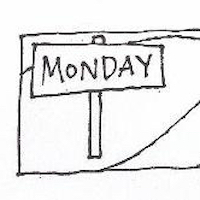|
Psalm 109:1-3
Hold not your tongue, O God of my praise, for the mouth of the wicked, the mouth of the deceitful is opened against me.
They speak to me with a lying tongue, they encompass me with hateful words.
Despite my love, they accuse me. But as for me, I pray for them.
Matthew 5:44: From Jesus’ Sermon on the Mount
But I say to you, Love your enemies and pray for those who persecute you,
The Bible tells us to love our neighbors, and also to love our enemies; probably because generally they are the same people.
– G.K.Chesterton
Whenever you are confronted with an opponent, conquer him with love.
– Mahatma Gandhi
|
A blessed CyberMonday
I guess this is the day I’m supposed to shop online. So don’t tell my family, but I found a site that has some cheery season’s greetings on t-shirts, gifts that may well appear under the tree at my house. Again, mum’s the word. Herewith a sample of t-shirt messages that caught my eye:
My wife says I only have two faults: I don’t listen and something else.
I’m not arguing. I’m simply explaining why I’m right.
People say I’m condescending (that means I talk down to people)
I’m particularly taken with that last one about condescension. I’ve been thinking lately about the phrase occasionally heard in my neck of the woods. Often people make some snarky observation about somebody. Then they punctuate cutting, critical comments with the ever-popular “Bless their hearts” as if to soften the blow. It doesn’t.
All of which has led me, in turn, to think about what it means to bless other people. I’m thinking of something beyond gesundheit. How do we bless? And why? A friend recently came to me with a question, a quandary. This person was powerless over her own judgmental spirit against someone in her life. She had no illusion that this other person would change. She needed counsel about how to manage her own feelings. What would you have said to her?
I told her I’d pray about it, which is sort of a way of stalling because I didn’t really know how to answer. You see, it’s a spiritual growth edge for me as well.
As I reflected on her heartfelt question, her desire to be more loving, more like Jesus, the answer that came to me (later) had to do with blessing. What would it mean to pray God’s blessing on the person who triggered judgment? What would it mean to pray God’s blessing on people who have done you wrong? Not in a condescending way, but in a way that wished that person well, that recognized that God loved that person without condition, a person made in God’s image.
I’ve heard for years that a way to navigate ill feeling, hurt, resentment toward another person (justified or not) is to pray for that person. That is not some new, power-of-positive thinking idea. It’s not a gimmick, but it can become a spiritual practice. Every time I read Psalm 109, I’m struck with the wisdom of the author who contended with enemies. The psalmist admits: Despite my love, my enemies accuse me, but as for me, I pray for them.
Jesus may have had that psalm in mind when he preached the Sermon on the Mount. He told his disciples to pray for enemies. I have a feeling that advice was meant more for the person who was called to prayer, and not so much for the enemy. I suspect, in the final analysis, we can’t do much to change attitudes or actions of others, people we know from work, neighborhoods, relatives, political or religious leaders. That kind of change is God’s work.
But we can come to a new place in our own hearts, in the ways we regard them. It usually begins with some awareness that we have been blessed, graced, forgiven ourselves. Jesus came preaching and practicing forgiveness to show us a new freedom. He came to invite us to a place of blessing, not in some condescending way, but wishing the best, wishing healing and wholeness for those who push our buttons, speaking goodness into their lives, maybe recognizing our own part in broken relationships.
Bless you in your day. Bless you in this holy season. May you and I be a blessing this week. And may all those in our lives, those we love and those who drive us nuts, be blessed.
-Jay Sidebotham
 Contact:
Contact:
Rev. Jay Sidebotham
jsidebotham@renewalworks.org
RenewalWorks is a ministry of Forward Movement.
www.renewalworks.org


